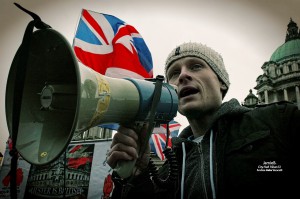 By arrangement I met Jamie Bryson in the café of Linenhall Library for our interview. I had read his – now banned – book on Nama (The Three Headed Dog), in which he alleged financial and political corruption within the DUP involving property deals and kickbacks, a charge strenuously denied by Peter Robinson, but a story which is still playing out. I had also been impressed – and I think the DUP were also taken by surprise – by Bryson’s composed and articulate performance before the Stormont Finance Committee last September.
By arrangement I met Jamie Bryson in the café of Linenhall Library for our interview. I had read his – now banned – book on Nama (The Three Headed Dog), in which he alleged financial and political corruption within the DUP involving property deals and kickbacks, a charge strenuously denied by Peter Robinson, but a story which is still playing out. I had also been impressed – and I think the DUP were also taken by surprise – by Bryson’s composed and articulate performance before the Stormont Finance Committee last September.
Bryson, of course, is best known as the face of the flag protest, but is now back in the news as the campaign manager for expelled South Belfast DUP Councillor Ruth Patterson in this May’s Assembly election. Patterson, a former UDR soldier and outspoken loyalist, who received 3,800 votes in the 2011 Assembly election, had expected that she would automatically replace her 2011 running mate, DUP MLA Jimmy Spratt, upon his retirement on health grounds last September.

Emma Pengelly
Instead, Spratt was replaced by Emma Pengelly who, four weeks after her elevation, was appointed a junior minister in the Office of the First Minister and Deputy First Minister (OFM/DFM). On Twitter Pengelly’s handle is @little_pengelly.
Little is her maiden name. I have met her. She is a lawyer and an accomplished, professional person, highly articulate and impressive – which explains her meteoritic rise within the DUP and which might explain her initial shyness about her father, Noel, a former UDR man. He was once pictured alongside Ian Paisley and Peter Robinson, was arrested in a Paris hotel in 1989 along with an apartheid South African diplomat and a US arms dealer by the French Security Services and served two years in jail. Little, who worked in Short Brothers at Castlereagh, offered South Africa stolen ground-to-air Blowpipe missile technology to destroy Angola’s MPLA and Namibia’s SWAPO, which were supporting imprisoned Mandela’s ANC’s anti-apartheid struggle.
Despite her profile and office Pengelly has yet to be elected, whereas Ruth Patterson had, at the last count, a considerable following of thousands in South Belfast and has the potential to take an Assembly seat.
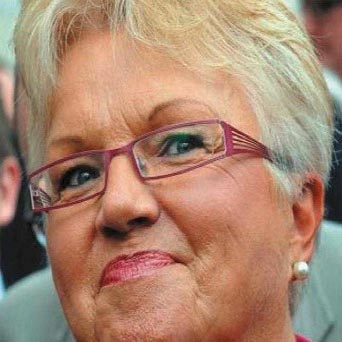
Ruth Patterson
She has softened her image in recent times with the aim of attracting right-wing, middle-class unionists. Councillor Ruth Patterson was also once in the dock. Sinn Féin was organising a parade in Castlederg, its first in nineteen years. On social media Ruth supported an imagined gun attack on the republican march, and said, “We would have done a great service to Northern Ireland and the world.” She was later charged and apologised.
There are few surprises within unionism and loyalism. Their numbers are few. There was Brian Faulkner’s conversion to power-sharing and a Council of Ireland. And there was David Ervine, a former UVF P.O.W., an Irish passport-carrying loyalist, who was prepared to upend the norms.
In recent years I have watched Jamie Bryson – who is not Sandy Row- or Shankill Road-born, but from Bangor in North Down.
This is our conversation which appears in this week’s Andersonstown News.
“Explain South Belfast,” I asked.
“When Ruth decided to run as an independent she contacted me and asked would I act as her campaign manager. We had known each other from the flags protest but I was also working in the background with her when she was ‘exiting’ the DUP late last year. She missed out narrowly in 2011 and I think that vote is still there. I look forward to the contest and think that personally it will be an opportunity to articulate a better vision to keep Unionism moving forward.
“I’ve made no secret that I have political ambitions myself, but for now my sole focus is on winning South Belfast along with Ruth Patterson,” he said, clearly a reference to the fact that if Patterson does get elected to the Assembly she could ‘gift’ her City Hall seat to Bryson as her replacement.
“You know,” I said, “that the DUP will portray a gain for Ruth as a gain for Sinn Féin which will increase the possibility of Martin McGuinness becoming First Minister.”
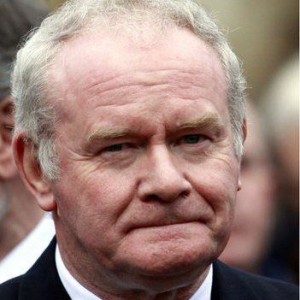
Martin McGuinness
“That’s a ridiculous argument to make. Robinson, and now Arlene, can’t sign a letter without McGuinness okaying it. Any unionist that doesn’t recognise that is being conned by the DUP. It’s a joint office. That argument plays into the fear politics and it’s aimed at intimidating others, within Unionism, with a different view from standing against the DUP. Even as First Minister, McGuinness will not have any more power after May than he has now. The core problem is the ludicrous system of mandatory coalition that allows that joint office, and it is the DUP that props that arrangement up.
“I hope that as many unionists as possible get elected. And if Emma Pengelly (DUP) is one of those, then great. But on the other hand, if Ruth gets elected at the expense of Emma then I won’t shed any tears over that. I had a long tussle with Peter Robinson and well, Emma is where she is because of Peter’s patronage in my mind.
“South Belfast is a huge challenge. It’s difficult to get an independent elected anywhere. I’m sure the DUP will pour in vast resources to this fight. Ourselves, we are relying on small donations and many voluntary workers, working-class people, middle-class people.”
You have to admit, I said, that you have nothing to offer nationalists.
“Well, if I was a nationalist I wouldn’t think of voting for a unionist! But I am an unashamed unionist. But if a nationalist came to Ruth with a constituent problem then the door is wide open with a welcome.”
I asked him why he wasn’t a member of the TUV and why Patterson wasn’t running under Jim Allister’s banner, which would seem the natural home for them both given their anti-Agreement stance.
“If I joined the TUV the first thing I would be asked would be to condemn loyalists and say that their actions had been wrong and I couldn’t do that.”
So, does that mean there’s room for loyalist paramilitary activity currently?
“No. Absolutely not. There’s no need for any paramilitary activity but there is a need for community activism. Loyalist ex-prisoners and ex-combatants are positively working within the community and that must be supported and encouraged.
“Today the only way forward is through democratic politics.”
If that’s the case, I asked, why doesn’t he accept the democratic results of the referendum on the Good Friday Agreement when the majority voted for power-sharing?
“The essence of democracy is the right to challenge the status quo and I don’t accept the status quo of the Belfast Agreement,” he said.
“There is no obligation on me to accept something that I disagree with. There is an obligation on me to obey the law, so long as that is the law of the country, and the only way to change it, to fight it, is through democratic politics and the law. I articulate my opposition to the Agreement within the law.
“I don’t disagree with power-sharing per se. I disagree with the mandatory coalition nature of power-sharing here. The system of government that in my mind perverts democracy. It engenders mistrust between the two communities. In terms of the, let’s say, ‘conflict generation’ there will be many within unionism who will look at people who were active in the IRA and say, ‘I couldn’t trust them, they’ve blood on their hands.’ I am sure many republicans would look at unionists who were involved in the Third Force or UDR and say, ‘they’ve got blood on their hands.’ Now, of course, I don’t agree with that narrative but I can understand why nationalists may feel that way.
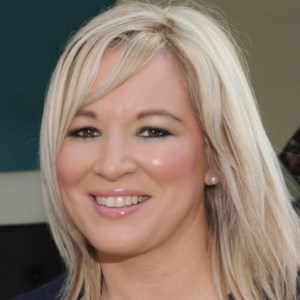
Michelle O’Neill
“When you go beyond that to, I suppose, my generation, Sinn Féin’s Michelle O’Neill’s generation, for example, it would be ridiculous for me to say that I couldn’t work with an individual like her because she, or they, do not have the historical baggage. What I disagree with is the very basis of the Belfast Agreement where it says we will always have the mandatory veto for both sides, because you can never ‘trust’ your neighbour to govern. I feel that is wrong.”
I said that the nationalist community doesn’t trust the unionist parties, given their experience since 1920. And that’s why they demand mandatory power-sharing.
“But how long, in that sense,” he replied, “does that go on for?”
“Until there’s a united Ireland,” I said. We both laughed.
“Well, obviously that’s why I say that that mandatory veto is proof of a long-term republican strategy. You are absolutely entitled to strive for a united Ireland, as I’m entitled to oppose you. But are republicans saying that, for now, they don’t even trust my generation to govern, the under-40s? We didn’t discriminate against you.
“Yes, years ago, I would have taken the view, in hindsight a sectarian view, that discrimination and other things were justified, in the sense that unionists at the time of partition had to secure their position, secure the status quo. But when I looked into it I came to the decision that what nationalists suffered was totally wrong. The state was biased in favour of my community and we trampled down another community. Totally unjustified. We could have done things differently to preserve the Union.
“But we now have to trust each other. If I said to Michelle O’Neill that I don’t trust you because of what the IRA did, and she said I don’t trust you because of what unionists did, we would be in a perpetual cycle of mistrust.”
I pointed out that just a year ago Sinn Féin thought they had a done deal with the Stormont House Agreement only to discover, as a result of a leaked civil servant document, that the DUP was deliberately wiping its eye with regard to the actual figures covering those on welfare. Had Simon Hamilton’s paper been passed in the Assembly then unionists would have rolled around laughing as Sinn Féin struggled to explain its ineptitude at the ambush.
“Well, you can’t be fly,” he said. “You have to be honest about what you are doing. You have to place your cards on the table.”
I said that as a republican I am using the Good Friday Agreement and cross-border bodies to create a harmonisation which will make a united Ireland, however it is configured, much easier. But that this process is open and transparent, there is no threat, no duress. I said that in my opinion so much has been achieved regarding nationalists that the gun is no longer justified and we have to make sure that conflict does not break out again.
“But I would like to reverse the Belfast Agreement,” he said. “But not revert to a position of gerrymandering or discriminating. As a unionist, the Agreement gives nationalists an advantage, a number of key mechanisms assist in moving towards a united Ireland and I am entitled to oppose it. For the preservation of the union, it would not be a smart, strategic move to concede to the terms of the Agreement where so much of the trajectory works in favour of nationalists.
“In Gerry Adams’ words ‘equality’ is the republican Trojan Horse, aimed at destroying the union. It’s all about achieving your ultimate goal of creating a united Ireland and I am entitled to oppose it. Take for instance the invitation to the Northern Ireland team and the Republic of Ireland team to a reception at Belfast City Hall. It’s an attempt to create parity. But the Republic is a foreign jurisdiction. To fete the two teams as equal is part of the wider republican agenda to create parity, harmonisation and eventually a united Ireland.
“If republicans sign up to there being no change to the union without the say-so of a majority in Northern Ireland then the flip side of that is that they have to recognise that we are part of the UK and therefore the national team for us is the Northern Ireland team and the national flag is the Union flag and it should have prominence. I respect that you see this as an occupied state. But how can I, as a unionist, willfully concede mechanisms that are going to help you advance your goals. That wouldn’t be a strategically clever move! When I say that I want to reverse the Belfast Agreement I want to reverse it because I see the dangers, the dangers for unionism, and not that I want to trample over nationalists. I want us to be equal.”
Okay, I said. Would you accept a 51% majority in the North voting for a united Ireland?
“I would have to. But I would be a liar if I sat here and said that I’d be happy. It’s easy being a democrat when things are going your own way! How would I feel if that was to happen? I don’t know. That’s the honest truth. At this time, at the end of the day, democracy suits my purpose,” he said, smiling.
I told him of my suspicion, given the original artificiality of the six-county state. I told him about the response of the late Harold McCusker, an Ulster Unionist MP for Armagh, to the question of what if a nationalist majority emerged in the North and peacefully voted for a united Ireland. “We would simply re-partition”, said McCusker. So, nationalists would be robbed again, as they were with the first, second and third Home Rule Bill.
“Yeh, we’ll end up with about two counties!” he joked.
I said, if you’d been cute you would have gone for four counties! “You would have been so secure and confident that you wouldn’t have needed to do away with PR elections, gerrymander or discriminate.”
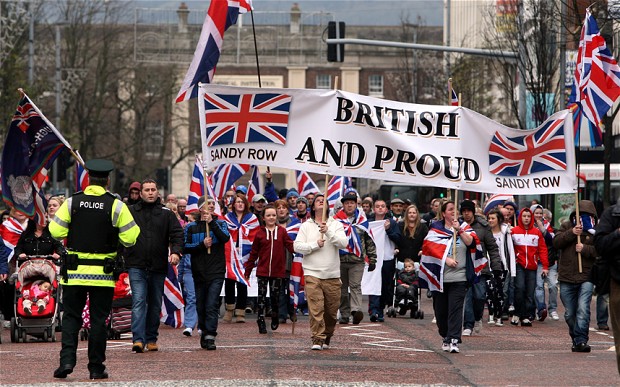
Flag Protest, City Hall
We returned to the flag protest. I said that the Union flag still flies above the City Hall on designated days, the same as over Buckingham Palace. (He had yet to be interviewed on Radio Ulster’s Talkback when he called for the ending of the weekly flag protest.) I also conceded that perhaps Sinn Féin did not anticipate the magnitude of loyalist anger.
“Well, did it do Sinn Féin much good in the long term? It stalled moving things forward in Stormont. It made life harder for the DUP because you now had people like me and like Jim Allister raising our voices and being heard. The flags protest energised our people and gave us a platform.
“Even before the flags protest I was opposed to the DUP but I was written off as a maverick, a lunatic shouting in the wilderness. But as a result of the political climate created by the flag protests our grievances were aired, we got across our anti-Agreement message with many, many unionists, which made it difficult for the DUP to move.”
I said that the DUP was defending unionism and the union.
“They hounded Trimble about guns and government. They’re now in government and the IRA Army Council still exists and the IRA still have guns! How can they do that? I suppose the DUP and their supporters will always say I took the wrong road and I will always say they took the wrong road. There really is no reconciling that.”
I told him it’s called realpolitik.
“Might be pragmatic, but from my point of view, as someone who wants to take power from them and reverse the concessions they have conceded, it’s a stick to beat them with.”
There’s no such thing as a free lunch. Jamie paid for the coffee!

